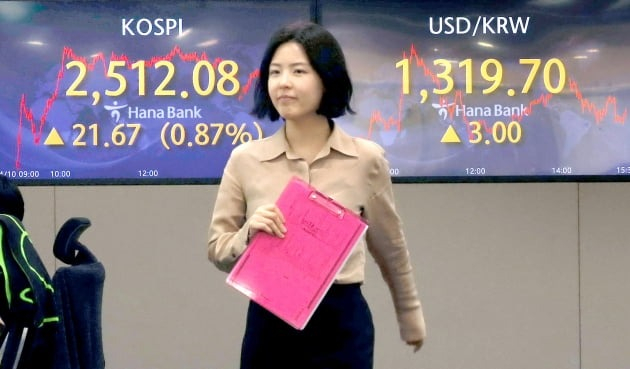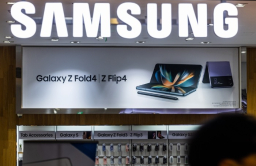-
KOSPI 2577.27 -2.21 -0.09%
-
KOSDAQ 722.52 -7.07 -0.97%
-
KOSPI200 341.49 +0.02 +0.01%
-
USD/KRW 1396 -2.00 0.14%
S.Korean stocks at 8-month high as foreigners chase Samsung
Korean stock market
S.Korean stocks at 8-month high as foreigners chase Samsung
Kospi enjoys largest stock inflows since late January; battery, cell materials shares also rally
By
Apr 10, 2023 (Gmt+09:00)
2
Min read
News+

South Korean stocks hit an eight-month high on Monday as foreign investors continued to chase Samsung Electronics Co., the country’s most valuable company, after the global memory chip leader said it is cutting semiconductor production, easing concerns over the industry’s supply glut.
Electric vehicle battery and cell materials makers also rallied as they are expected to benefit from US tax credits for the eco-friendly automobiles.
The Kospi ended up 0.87% to 2,512.08, the highest closing since Aug. 17, 2022. Foreign investors bought a net 731.8 billion won ($554.6 million) in the main bourse, their largest daily purchases since Jan. 27, absorbing 297 billion won in Samsung, which rose to a 10-month peak of 66,300 won on Monday, according to the Korea Exchange.
“Investors, which have been focusing only on the battery sector, started looking for semiconductor and battery material industries. That will help local stock markets rise further,” said Choi Kwangwook, the chief investment officer at J&J Investments Co. which manages 3.5 trillion won in assets, in Seoul.
On Friday, the Kospi saw net inflows of 701.4 billion won with offshore investors buying a net 876 billion won worth of Samsung stocks.
That came after the South Korean tech giant said it is curtailing chip production after its semiconductor business posted its first quarterly loss in more than a decade.
BATTERY AND MATERIALS
Battery-related names such as LG Energy Solution Ltd., EcoPro BM Co., POSCO Holdings Inc. and LG Chem Ltd. also rallied on Monday.
LG Energy, the world’s second-largest EV battery maker, gained up to 3.1% to 598,000 won, the highest since Nov. 21, 2022. The company is expected to see the benefit of 5.8 trillion won in the next three years from the US Inflation Reduction Act.
“The company is expected to maintain the momentum for earnings improvement,” said Kim Chuljoong, an analyst at Mirae Asset Securities Co., raising the target price of LG Energy shares to 900,000 won from 750,000 won.
“We may need to continue to upgrade forecasts for its earnings including incentive estimates.”
EcoPro BM, South Korea’s top cathode maker, soared by as much as 22.52% to a record high of 315,500 won as Washington decided to classify the battery materials as minerals for the tax incentives for EVs. Its share prices have more than tripled so far this year, becoming the largest company by market value on the country’s junior Kosdaq.
Other battery material makers such as LG Chem and POSCO Holdings, the parent of POSCO Future M Co., gained 5.04% and 7.85% on the day, respectively.
Some warned of risks such as earnings disappointment for the first quarter and rising oil prices, however, expecting only gradual rises in the South Korean stock markets.
“Despite the Kospi’s recovery, concerns over corporate earnings and any bad news from the US could hurt sentiment here,” said Kim Tae-hong, chief executive of Growth Hill Asset Management Co. in Seoul, which manages 699.4 billion won in assets.
Write to Eui-Myung Park and Tae-Ung Bae at uimyung@hankyung.com
Jongwoo Cheon edited this article.
More To Read
-
 Leadership & ManagementLG tops in market cap gain, beating Samsung, SK, Hyundai Motor
Leadership & ManagementLG tops in market cap gain, beating Samsung, SK, Hyundai MotorApr 10, 2023 (Gmt+09:00)
-
Apr 07, 2023 (Gmt+09:00)



